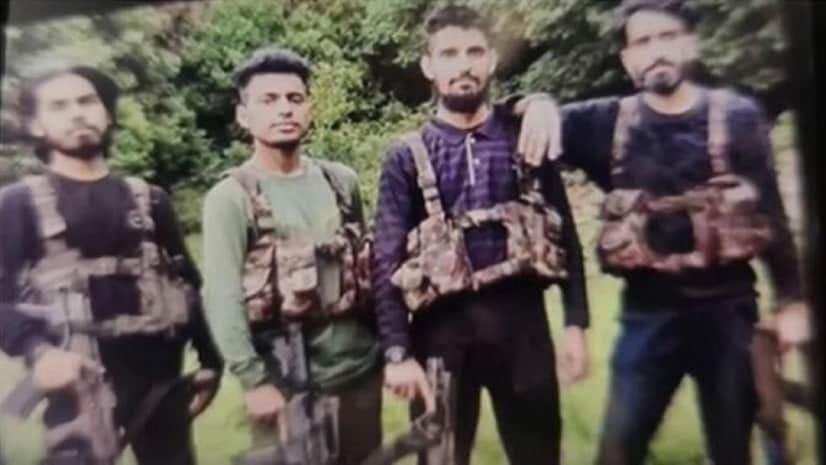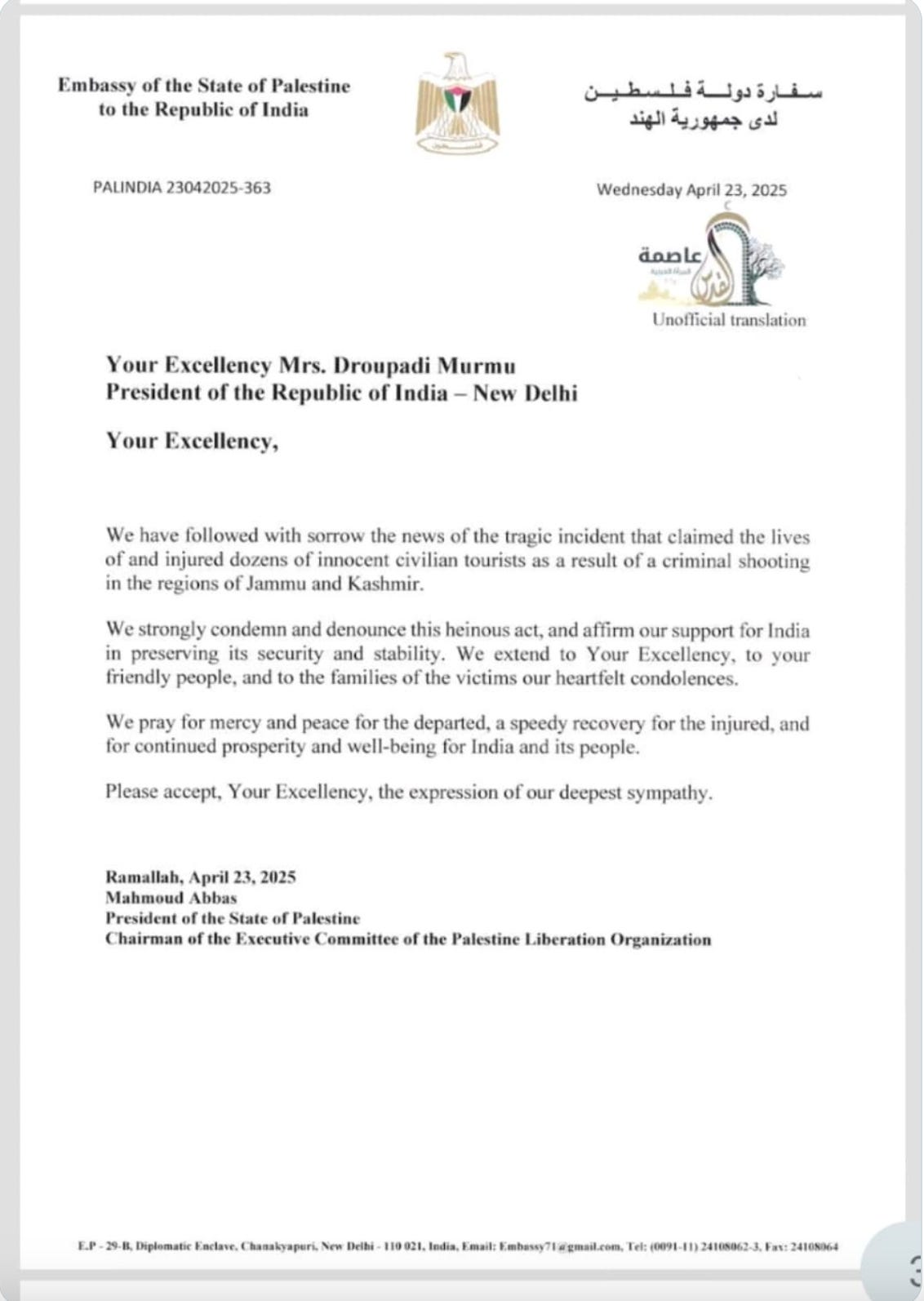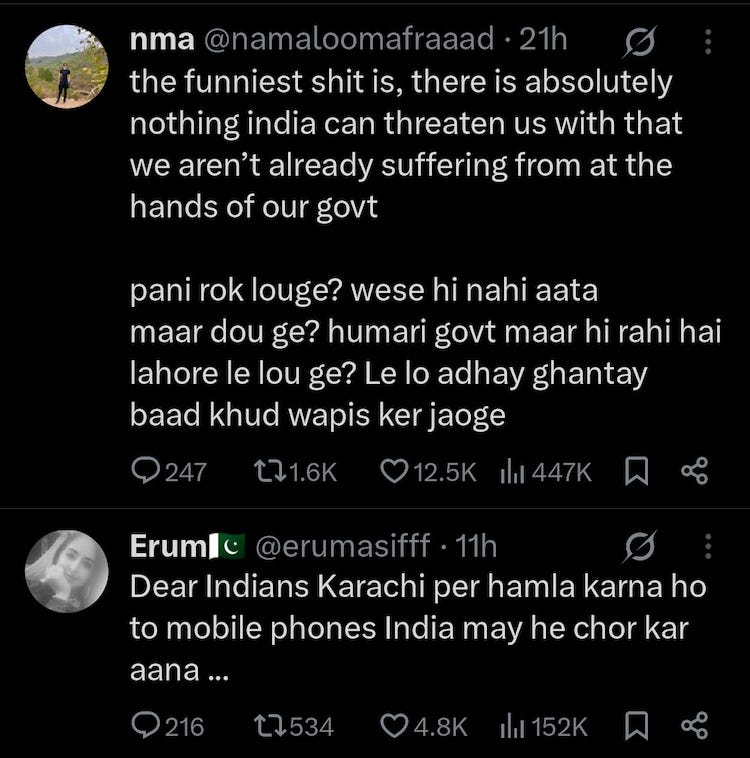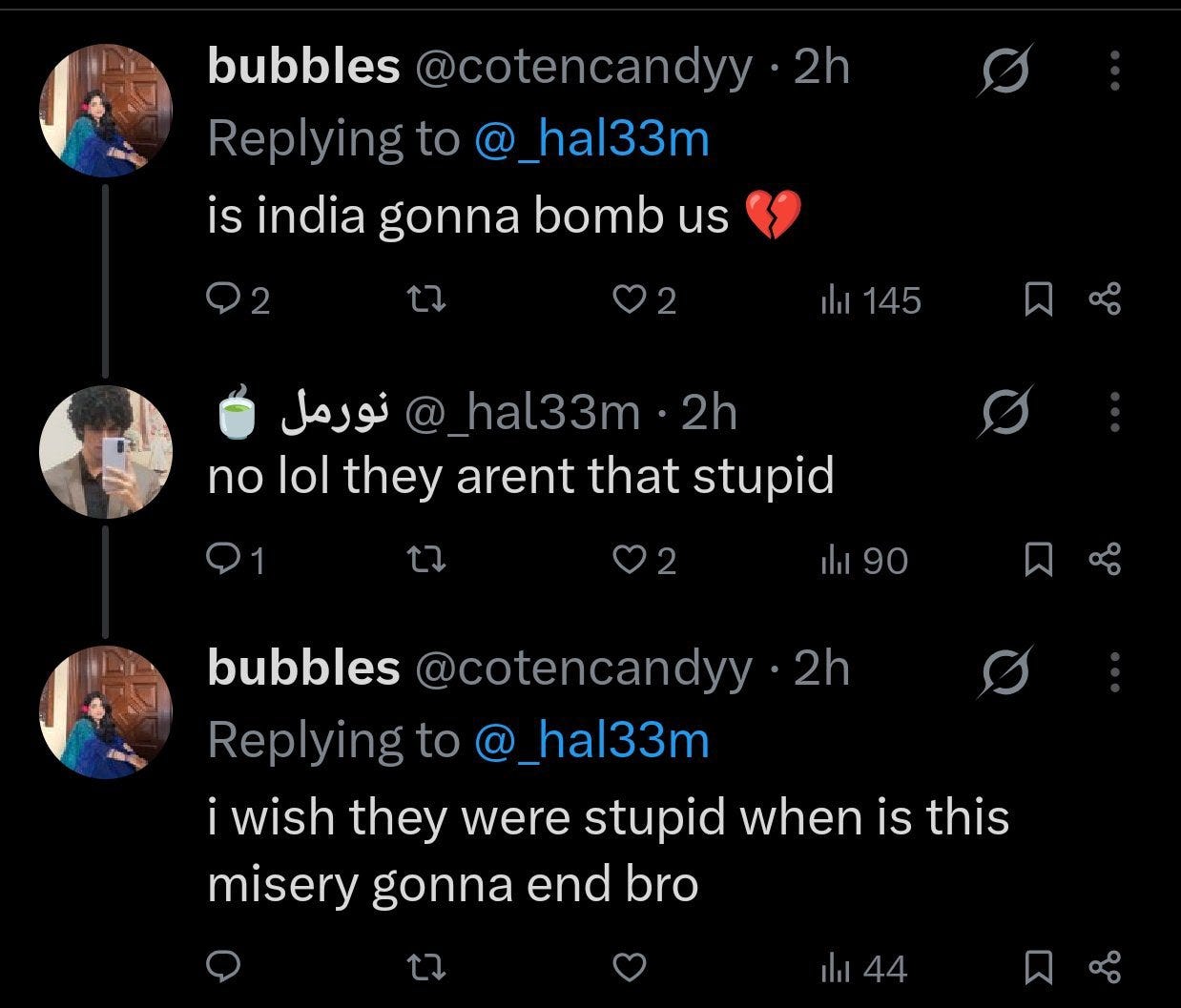Everything about Pahalgam, Kashmir, India, Pakistan
Secularism, Pakistan as a nation, War, Islamists, Indian-Americans and more.
Last week was a whirlwind. All my wife’s cousins were staying at our house — one of her cousins was getting engaged and our home was the venue. The preparations left me with little time to write a post.
I had planned on continuing the discussion on Industrial Policy. I was going to examine what China and other East Asian economies had done to lift themselves up. Those choices would then be contrasted with the ones that India made.
But then the Pahalgam terrorist attack happened and it changed the schedule. It’s been a few days since the attack. Everyone’s had time to put out their assessment of the situation. The discourse is fast and changing, yet there are some consistent themes that have emerged. Some of these themes have been unchanging for the past few centuries. This post will examine all angles of the terrorist attack and provide links for further reading.
To future proof this post, I’ll recap what happened at Pahalgam. While tourists were roaming the Pahalgam valley — one of the most scenic spots in Kashmir — a group of 4 terrorists started asking everyone to recite the Kalima. Many were asked to remove their trousers, checking for circumcision — Hindus and Christians in India are uncircumcised. Anyone failing this filter was shot. Their wives and children were let off and were told to “go tell this to Modi”. The total death toll was 28. It could’ve been higher, but the terrorists weren’t maximizing body count. They were maximizing shock value.
For those, who don’t know, just a few days ago, Pakistan’s Army Chief, Gen. Asim Munir claimed that India and Pakistan were two separate nations and that Hindus and Muslims couldn’t ever co-exist together. He exhorted his audience to share this with their future progeny and keep the Pakistan dream alive. Check out the full speech below.
India’s retaliation and Pakistan’s counter-retaliation
India retaliated within 24 hours:
The Indus Water Treaty was held in abeyance. Signed in 1960, it survived 3 Indo-Pak wars and countless terror attacks. It was widely considered unfair to India and PM Modi finally put it aside in 2025.
All Pakistani nationals were told to leave the country within a week irrespective of their visa status.
The strength of the Pakistani High Commission was reduced to 30 and all naval, air force and army personnel in the High Commission were asked to leave.
Pakistan retaliated by suspending the Shimla agreement1. Signed in 1972, after India won Bangladesh its independence, it turned the Line of Control (LoC) into the de-facto international border
Pakistan’s retaliation doesn’t hold much water. It hasn’t respected the agreement in any shape or form. The Kargil War is a prime example of Pakistan violating the agreement. It has also been waging a constant proxy war against India for more than a decade.
The crucial question is: Does junking the Simla Agreement mean a subtle declaration of war on India?
Domestic Reactions to the attack
Almost all opposition parties strongly rallied behind PM Modi, including — surprisingly — Asaduddin Owaisi’s AIMIM. The man says the right words at the right times!
Infuriatingly, Supriya Sule referred to the Pahalgam incident as a “firing incident”. Sharad Pawar, her father, said he wasn’t sure if the killers had asked about religion before ending the life of the men. This is textbook deflection intended to protect their party’s vote bank.
This contrasting approach between Owaisi and Pawar is the “Only Nixon could go to China”2 phenomenon playing out here. Because, Owaisi had adopted such aggressive, hawkish stances against Hindus, he could condemn the incident without losing votes, but the Pawars couldn’t.
Manish Tewari, the Indian National Congress (INC) MP from Chandigarh, authored a trenchant editorial in The Tribune. I’ll quote:
As long as Pakistan exists as a nation where the military has a country and not a country that has a military, state-sponsored terrorism will not go away. That is the hard reality.
What India has to plan for is the permanent extinction of this artificial state of play in existence since 1947, irrespective of the cost in terms of blood and treasure.
There has to be an Indian state whose natural boundaries are till the eastern bank of Indus and then the larger Pakhtunistan from its western bank, which is and was the natural political, strategic and geographical order of things through millennia.
This is the endgame that India must seriously prepare for to protect itself from this intrinsically hostile entity on our western borders. It will not happen tomorrow but definitely someday if India gets serious about dealing with this scourge once and for all.
These are strong words coming from a representative of the INC. He’s essentially arguing for territorial expansion to remove the threat that Pakistan has presented since 1947. He recognizes that until the Pakistani State itself continues to exist, such terrorist attacks will keep coming. There might be a lull every now and then. Indian citizens might slip into the delusion of normalcy. But eventually the fountainhead of that ideology will strike.
Tavleen Singh, usually ideologically opposed to the BJP, was also in favour of strong action against Pakistan.
If the Prime Minister declares war on Pakistan, he will have the whole country behind him. If he does nothing, he will lose everyone’s support because most Indians feel that our leaders have too often in the past done nothing after a jihadist attack from Pakistan. I count myself among them and have no hesitation in admitting that I was ashamed that our Prime Minister did nothing other than send Pakistan’s generals dossiers of proof after the 26/11 attack. This was taken as a sign of India’s weakness not strength.
Pratap Bhanu Mehta, another liberal often ideologically opposed to Hindutva, says that until Pakistan practices terrorism, true secularism can’t be achieved. Quoting directly:
Terrorism does not directly produce domestic communalism in India. Quite the contrary: It also unites India across communities in anger and grief. But what it more subtly does is reinforce the idea that so long as India remains besieged by states like Pakistan, with weaponised religious identities, the 1947 modus vivendi of a secular India is no longer viable. Either the logic of 1947 must be completed, or it must be undone. This is the dominant mood in contemporary India. The consequences of either option are too dire to contemplate. The falcon of peace and secularism is in free fall, and there is no falconer to whose call it can respond.
Personally, I loved Shashi Tharoor’s reaction to this. He didn’t resort to ifs and buts, didn’t hedge his position, and didn’t try to score any political points. He clearly called out the religious nature of the attack. And while he did acknowledge intelligence failures, he clearly said that the time for an investigation would be after Pakistan had been dealt with. An uninformed political observer might think that he’s a part of the BJP.
International Reactions
The US unequivocally condemned the terrorist attack. It’s fashionable for outlets like the NYT to use euphemisms like “gunmen” or “militants” to refer to terrorists. The Republicans weren’t having any of it.
The US Democrats are very conspicuous in their silence. This is an indication of the Islamists in their ranks — Ilhan Omar and Rashida Tlaib among others.
Kash Patel, the FBI director and Tulsi Gabbard, the director of National Intelligence both denounced terrorists and announced complete support to the Indian government. Tulsi Gabbard was the only one who went one step further, mentioning the Islamist nature of the attack and the religious profiling.
Most other G7 countries were quick to offer their support and condolences. With one exception — Canada. While other countries were quick to offer strong support on the day of the attack itself, Canada’s leading politicians waited a complete day. And when they did tweet, it was a wishy-washy condemnation3 — the kind you say out of peer pressure
Who carried out the attack, Pierre? Why mention “terror in all its forms”? This is signaling the Khalistani-Islamist nexus that he’s on their side and won’t go against their interests. Jagmeet Singh, the lodestone for Khalistanis-Islamists and leader of New Democratic Party (NDP), has not uttered a word against the attack. Conspicuous silence.
As expected, the Israeli government mentioned the Islamic nature of the attack and condemned it. Many Israeli handles on Twitter were staunchly supportive of the Indian government and the population. Israel and India both face similar threats from Gaza and Pakistan. It isn’t an understatement to say that Israel is probably the only country that truly understands what choices India faces. Intelligence reports indicate that Hamas helped out in planning the attacks.
The Palestinian Authority expresses sorrow for the lives lost “as a result of a criminal shooting”. I don’t expect them to criticize the Hamas playbook anyway!
The Muslim World League, an organization based in Saudi Arabia, strongly criticized the attack and noted its religious nature — something so many other countries and politicians have failed to do. It gives me hope that Saudi Arabia may be succeeding with its pivot to moderate Islam.
News Outlets
As expected, Al Jazeera is wailing over India’s “collective punishment” to Kashmiris. Al Jazeera is funded by the Qatar government so it’s no surprise that they’ve chosen this stance. They’ve reported that Kashmiris are calling themselves “cursed”. Their editorial line is strongly anti-Modi and their coverage proves that.
The New York Times (NYT) often refers to terrorists as “militants” or “gunmen”. The US foreign office published a correction to the NYT report. This isn’t an isolated mistake. It is an editorial choice designed to play down the threats faced by Hindus. When 9/11 happened, the NYT didn’t call it an “incident” or an “attack”. I guess when it happens to Hindus in India, it is fine.
The BBC — not one to be left behind — cutely referred to the terrorists as “gunmen”. As if they were there to rob a bank! And this wasn’t a one-off thing. They did it multiple times.
Nirmalaya Dutta writes in a Times of India editorial:
It is not that the Western media does not know better; it is that they choose not to do better — because doing better would require confronting the uncomfortable truth that victims do not always conform to the neat narratives carved out for them, and that not all ideologies are equally safe, or politically convenient, to expose.
The future of Secularism
For all intents and purposes, this incident has rendered secularism dead — not that it was thriving before. I have written earlier that while India is naturally plural, it is impossible for it to be secular.
The attack was the latest in a long line targeting Hindus exclusively for their religion. Even the exodus of Kashmiri Pandits from their ancestral homes in the early 1990s was the culmination of a long campaign targeting them exclusively for being Hindu.
Pakistan itself was founded on the premise of a separate home for Islam and it makes no bones about the fact. The repeated attacks on India are merely its attempts to establish an Islamic state across the subcontinent — the famed Ghazwa-e-Hind. Pakistan doesn’t officially accept this ideology. The Lashkar-e-Taiba (LeT) does and gets support from the Pakistan Army and its intelligence agency, the Inter Services Intelligence (ISI).
The truth is in the pudding. Hindu, Sikh and Christian minorities across Pakistan and Bangladesh have seen their numbers dwindle. India passed the Citizenship Amendment Act (CAA) to offer these minorities accelerated citizenship. Under a truly secular state, the religion shouldn’t matter. But the partition of India on Islamic lines can’t be ignored.
In response to the terrorist attack, the Indian government’s first move was to expel all Pakistani nationals on visas. This quickly raised a problem. What about the Hindus from Pakistan who were in the country on a visa? Sending them back would be condemning them to death. The Ministry of External Affairs (MEA) quickly clarified that this wouldn’t apply to them. This defies secular orthodoxy—but anyone with even a rudimentary grasp of Indian history understands why.
As I wrote in the post on secularism, it is difficult to draw a line between Hindu culture and religion4. When India faces Islamic terrorists, attempting to build a secular state is a fool’s errand.
Inverting the oppressor and oppressed
Aga Syed Ruhullah Mehdi, the National Conference (NC) MP from Srinagar, expressed contempt for tourists in Kashmir. He said that in his book this was “cultural invasion”.
Let’s dissect this mentality. Kashmir has temples older than Islam. Islam’s first foray into the subcontinent was the successful attempt by Muhammad Qasim against Raja Dahir of Sindh. After that, it would take another 500 years to establish the first Islamic Sultanate in India. But Kashmir itself would come under Islamic rule only around the 14th century. Kashmir had kings from different religions, but only during Islamic rule did aggressive proselytization occur.
The name Kashmir is derived from the sage Kashyap. Shankaracharya is said to have meditated at a hill atop Srinagar towards the end of his life — around the 8th century AD. It is difficult to deny its Indic roots and origins. In such a case, how can Hindus be accused of settler-colonialism? Hindus are indigenous to the land and can trace their connections back thousands of years. This isn’t a case of revanchist ambitions. It is a genuine yearning to be connected to their roots. It doesn’t preclude sharing of the land with members of different faiths.
What will happen in Britain?
The Pakistani Embassy’s military officer made a throat slitting gesture at a gathering of Indian protestors.
There are already Hindu-Muslim riots in Leicester. Subcontinental tensions have started spilling onto England’s streets5. Amongst all this, there are concerns that this will cause more rioting in Britain’s streets.
Mohammed Hijab, an extremist preacher based in the UK, has already asked Indian Muslims to side with Pakistan. With such elements as these, I wonder what the future of the UK looks like.
The Indian-Americans
The silence from prominent Indian-Americans speaks volumes. When the Gaza invasion happened on October 7th, 2023, Larry Ellison’s (who is Jewish) Oracle immediately announced support for Israel. Other ultra wealthy Jewish folks stood up for Israel. Josh Shapiro might have been lost out on becoming Harris’ VP mate because of his outspoken support for Israel.
I don’t see any prominent Indian-American in tech who has done the same for India, Kashmir or Hindus. Many tech companies have CEOs who are Indian — plenty even practicing Hindus. There are numerous wealthy people in this group. Why aren’t they speaking out?
Are they so afraid of the Hindutva label that they are afraid to castigate this incident? Does it affect their credentials in any way? What is the use of accumulating obscene amounts of wealth6 if you can’t speak your mind? Maybe they’ve been so deracinated that they view this as a subcontinent issue and view themselves above it.
Whatever be the case, the diaspora needs to learn that wealth purchases narratives. And these narratives can shape the way the issue is viewed globally.
Kashmiri Muslims
There’s definitely complicity of Kashmiri Muslims in this incident. Over Ground Workers (OGW) are those helping militants with ground and logistical support. Security agencies claim that 70 OGWs were helping out in the Pahalgam attack. That being said, I’m strongly against the harassment of Kashmiris in the rest of India7. It only serves to alienate the population against the rest of the country.
This isn’t new. All terrorist attacks in the past have had local conspirators. The two main parties in the region — being led by Mehbooba Mufti and Omar Abdullah — have allegedly had covert links with Pakistan. Both parties have had MPs and MLAs that have had separatist intent. Their election proves that a plurality of their constituents share this intent.
On the other hand, there are many Kashmiri Muslims who genuinely want to be a part of India, don’t like Pakistan and don’t want to be independent. Prominent names are Arshia Malik, Shehla Rashid, Amana Ansari and Khalid Baig. My only worry: how big is this community?
Clouds of War
War seems inevitable. Pakistan and India have been exchanging gunfire across the LoC for the past few days. Following the Uri and Pathankot attacks, India had retaliated with military action in two weeks. What will happen this time?
As a nation, we need to prepare ourselves for casualty. It is easy for me to say this sitting in the US while soldiers are fighting it out on glaciers. But as a nation, India hasn’t been left with an option. Without a strong response, we might save men on the battlefield, but we’ll lose them in terror attacks. The Indian population is extremely sensitive to any loss. Mourning families of soldiers capture the public imagination — rightly so.
As a X (formerly Twitter) user rightly put it:
The ability to absorb/process shock and awe , face shortages of essential commodities , interruption of services and stomach the loss of loved ones will be key. War and peace go hand in hand.
Getting used to prolonged periods of peace is dangerous because it causes lethargy at all levels. A periodic test of national character is important.
Miscellaneous Thoughts
I’ve gathered a few thoughts that don’t fit neatly into any section, so I’m sharing them here.
Do we truly want to reclaim of PoK? The region, though currently restive, is a crucible of extremist and jihadist elements. Reintegrating it would grant these forces unfettered access to the Indian heartland. Are we prepared to confront this reality? How do we differentiate bona fide residents from Pakistani infiltrators? Without clear answers, any move would be reckless. I like the idea of reclaiming our holy sites, but most have likely been desecrated by now. Beyond strategic advantage and a buffer zone, is there any compelling reason to pursue it?
Is Pakistan just Punjab? What does it mean for Pakistan to be a nation? Each province has its own separatist movement. Bangladesh seceded 50 years ago. Balochistan might secede in the next decade. Khyber Pakhtunkhwa is more affiliated with the Taliban than Pakistan. Sindh also has the Sindhudesh movement going on. Pakistan needs an enemy in India to keep it together as a nation.
Are the Afghans truly India’s friends or is it a case of my enemy’s enemy is my friend? The Afghan Taliban and Pakistan don’t get along. The Taliban famously gets along with the Indian government. Considering that they practice Sharia and an extremist version of Islam, how long can this bonhomie last?
How much superiority does the Indian military have over Pakistan’s? It is no use counting India’s superior numbers. India has to keep troops to guard borders with China and Bangladesh too. Last time India crossed the LoC, we lost a pilot and a plane.
Trump claims that India-Pakistan tensions go back a 1000 years. Is that one of his usual gaffes? Or does he actually understand Indian history?
Is Akhand Bharat an extremist dream? Or is it necessary for civilizational security? It doesn’t have to devolve into territorial revanchism, but India needs a way to have strong cultural influence on this area.
Finally, some memes
These are trying times. I want to leave you with some memes. Might as well have some fun while we’re at it!
Interestingly, the Simla Agreement didn’t mention the status of the Siachen Glacier. The glacier was considered too remote and mountainous by both countries. All that changes in 1984. India discovered that Pakistan had plans of capturing the glacier. It commenced its own Operation Meghdoot and managed to get on the glacier in the nick of time — before Pakistani troops could occupy it.
Without this crucial piece of territory, Pakistan and China would be sharing borders and looking down on Indian posts. Having wrested control of this territory, India can now keep a watch on the Gilgit-Baltistan region in Pakistan Occupied Kashmir.
Essentially, because Nixon was such a China hawk, only he could go to China and not feel the political hit. It is similar to how only Modi could broker peace with Pakistan, because no one doubts his resolve on national security issues.
All of Canada’s major parties are in bed with Khalistanis and Islamists making strong condemnations impossible without losing votes.
In fact, it is harder to define what the Hindu religion is. But that’s a topic for another day.
It is hard to feel sorry for England. All their karma coming back to bite them.
Also known as F U money.
I don’t buy the “we need to win hearts” argument. In sensitive border areas, there’s no place for such rhetoric. However, it must be recognized that there’s a good section of Kashmiri Muslims that themselves want to completely integrate with India. They’re suppressed and often killed by Kashmiri Pakistan sympathizers.














Very nicely wrote with great insight..salute to your efforts 🙏🏻
Nicely put!
Though I really hope that there's no all-out war. A significant number of males in my family serve in the Army, it might turn out to be horrible for us. Even though the soldier might be okay with it, the loss ends up being too hard on the families - almost ruining them and their future.